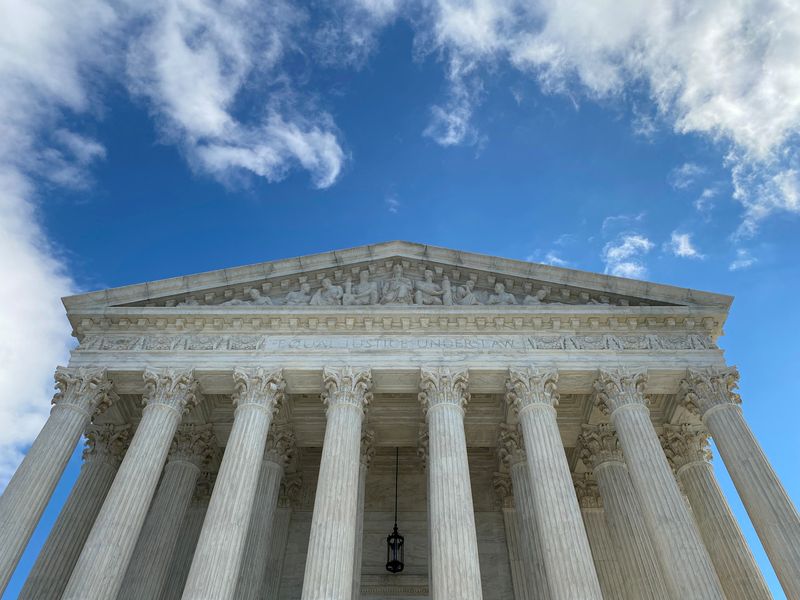By Andrew Chung
WASHINGTON (Reuters) - An evangelical Christian former mail carrier's fight with the U.S. Postal Service over his refusal to work on Sundays gives the Supreme Court another chance to widen religious rights but also has led to a debate over whether religious people are more legally deserving than others to weekend days off from work.
The justices are set to hear arguments on Tuesday in an appeal by Gerald Groff, a former mail carrier in Pennsylvania, of a lower court's ruling rejecting his claim of religious discrimination against the Postal Service for refusing to exempt him from working on Sundays, when he observes the Christian Sabbath. Groff sued after being disciplined for repeatedly failing to show up when assigned a Sunday work shift.
The court, with its 6-3 conservative majority, has a track record of expanding religious rights in recent years, often siding with Christian plaintiffs. A ruling favoring Groff could make it harder for businesses to deny a variety of religious accommodations to employees.
"The whole point of religious accommodation is you have to make special or favored arrangements in order to have an inclusive workforce," said Alan Reinach, one of Groff's attorneys.
Boston University School of Law employment law expert Michael Harper said that a ruling favoring Groff could "give a preference to the religious because they get to stay home on their Sabbath or their day of rest" that would be denied to nonreligious people.
Harper added, "Whenever you depart from neutral standards it creates the potential for greater friction in the workplace."
Unions representing postal workers urged the Supreme Court to carefully consider the issue of hardship that religious accommodations for some employees could have on co-workers.
"A day off is not the special privilege of the religious. Days off, especially on the weekend, are when parents can spend the day with children who are otherwise in school, when people can spend time on the other necessities of life, when the community enjoys a common day of rest for churchgoers and the nonreligious alike," the American Postal Workers Union said in a brief.
Groff's case centers on a federal anti-discrimination law called Title VII of the Civil Rights Act of 1964, which prohibits employment discrimination based on religion and other factors including race, sex and national origin.
Under Title VII, employers must make allowances for a worker's religious observance or practices unless that would cause the business "undue hardship" - which the Supreme Court in a 1977 case called Trans World Airlines v. Hardison determined to be anything imposing more than a minor, or "de minimis," cost.
Groff's attorneys have asked the Supreme Court to overturn the Hardison precedent and require companies to show a "significant difficulty or expense" before denying an accommodation.
Groups representing some religions that are in the minority in the United States including Islam, Judaism and Hinduism told the Supreme Court that the Hardison standard has disproportionately impacted them and should be revised.
"By allowing employers to refuse to accommodate employees' beliefs for almost any reason, Hardison forces devout employees to an impossible daily choice between religious duty and livelihood," the Muslim Public Affairs Council wrote in a brief.
Representing the Postal Service, President Joe Biden's administration told the justices there is no need to reverse Hardison because the Equal Employment Opportunity Commission (EEOC), the agency that enforces Title VII, and many lower courts already have interpreted that ruling to provide substantial protection for religious employees.
James Phillips, a law professor at Chapman University in California, said a "strong majority" or even all the justices could side with Groff.
"This may be one of those religious liberty cases where the right and the left are actually aligned," Phillips said.
SUNDAY DELIVERIES
Groff worked as a "rural carrier associate" in the towns of Quarryville and Holtwood in Pennsylvania's Lancaster County, a job that required him to fill in as needed for absent career carriers, including on weekends. The Postal Service in 2013, in a bid to remain profitable, contracted with Amazon.com (NASDAQ:AMZN) to deliver packages, including on Sundays.
Groff failed to report for assigned Sunday shifts. Postal officials sought to accommodate Groff by attempting to facilitate shift swaps, but were not always successful. His absences caused tension among other carriers who had to cover his shifts, the Postal Service said. Groff received several disciplinary letters and resigned in 2019.
"I hope the Supreme Court reaffirms our nation's commitment to providing equal opportunity and fair treatment in the workplace," Groff said in a statement provided by his lawyers.
University of Miami School of Law professor Caroline Mala Corbin, who specializes in law and religion, said that while the case could help minorities fully participate in the workforce, it also could tee up clashes between religious and secular values or LGBT rights.
For instance, Corbin said, a conservative Christian employee might have a better chance seeking a religious accommodation to refuse to use a transgender co-worker's preferred pronoun.
"My worry is that the Supreme Court will use this case as an opportunity to cement its privileging of religion over equally important, competing interests - especially to the detriment of vulnerable groups," Corbin said.
A ruling is due by the end of June.
